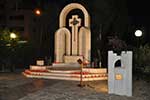Sassounian Column

TURKEY CAN RUN, BUT CAN’T HIDE FROM THE LONG ARM OF US LAW
World heavyweight boxing champion Joe Louis once warned one of his opponents: "You can run, but you can't hide." This same warning now applies to the Turkish government and two of its major banks.
Last December, when three Armenian-Americans filed a multi-million dollar lawsuit in U.S. Federal Court against the Republic of Turkey, the Central Bank and Ziraat Bank, the Turkish government ridiculed the charges, claiming "sovereign immunity."
The Armenian-American plaintiffs were seeking $64 million in compensation for confiscation of their properties in Adana, Turkey, in the aftermath of the Armenian Genocide. The plaintiffs were also demanding additional millions of dollars for the accrued rent and interest the U.S. government paid Turkey in the past 60 years for use of the strategic Incirlik Air Base, located on Armenian-owned land.
Since one of the first steps in filing a lawsuit is to serve a copy of the court documents to the defendants, the three Turkish entities concocted elaborate schemes to avoid receiving the legal papers, in order to delay or obstruct the trial. As a result, the plaintiffs' attorneys had to go to extraordinary lengths in the past nine months to deliver the court documents to the Turkish defendants.
Ironically, after making every effort to block the serving of court papers, the Central Bank and Ziraat Bank filed a motion on June 1, 2011, seeking dismissal of the case, arguing that they had not received the proper documents.
On August 2, 2011 U.S. Federal Judge Dolly Gee rejected the Turkish request, asserting that the plaintiffs' representatives "made several attempts to serve the Bank defendants at their addresses in New York City. After being repeatedly denied access to the buildings and, in one case, being misdirected as to Ziraat Bank's actual location, the process servers left copies of the summonses and complaint with the building security guards. Plaintiffs' counsel then mailed additional copies to the each of the Bank defendants at these same addresses."
The Judge ruled that the Republic of Turkey had been adequately served with legal documents and ordered the Turkish entities to present their pleading in court no later than August 19, 2011.
The plaintiffs' attorneys faced greater difficulties in serving the court documents to the Turkish authorities than to the New York offices of the two banks. On January 26, 2011, the English and Turkish versions of the complaint were mailed to the Ministry of Justice in Ankara, as required by the Hague Convention. On March 1, 2011, Turkey informed the plaintiffs' lawyers in writing, its refusal to accept the court papers, claiming that the lawsuit infringes Turkey's "sovereignty and security."
After exhausting all other channels, the plaintiffs' lawyers submitted the court documents to the U.S. Department of State on April 14, 2011, asking the latter to present them officially to the Turkish government. On June 20, 2011, the State Dept. advised the plaintiffs that the documents were forwarded through diplomatic channels to the Republic of Turkey.
The American Embassy in Ankara transmitted the documents with a "diplomatic note," warning the Turkish government that under U.S. law "a defendant in a lawsuit must file an answer to the complaint within 60 days from the date of notice or face the possibility of having judgment entered against it." The U.S. Embassy strongly urged the Turkish Foreign Ministry to comply with the requirements of United States laws or face "a default judgment."
On August 29, 2011, after the mandated 60 days had expired and no response received from Turkey, the attorneys for the Armenian-American plaintiffs asked the Federal Court to enter a default judgment against the Turkish defendants.
Vatan newspaper reported last week that the two Turkish banks, alarmed by the serious prospect of losing a multi-million dollar lawsuit due to their failure to respond to the U.S. Federal Court, rushed to hire a lawyer and asked for more time until Sept. 19, 2011 to file a response.
Should the Turkish defendants not show up in court on Sept. 19, the Federal Judge could enter a default judgment and order that their assets in the U.S., up to the value of the judgment, be seized and turned over to the Armenian-American plaintiffs.
The Turkish government can no longer hide from its responsibilities for the devastating damage caused to the Armenian people as a result of the Genocide. It is high time for Turkey to acknowledge its long history of colossal criminal acts and make appropriate amends.
By Harut Sassounian
Publisher, The California Courier




















